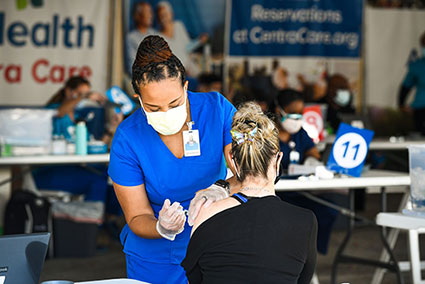What to Know About the Johnson & Johnson COVID-19 Vaccine
Johnson & Johnson recently announced that the COVID-19 vaccine developed by their vaccine division, known as Janssen Pharmaceuticals, has shown to be 66% protective against moderate-to-severe COVID-19 infection. It is 85% effective overall at preventing hospitalization and death in all regions where it was tested.
Johnson & Johnson has now received emergency use authorization (EUA) from the Food and Drug Administration (FDA), just as Moderna and Pfizer have.
How the Johnson & Johnson Vaccine is Made
The Pfizer and Moderna vaccines are made using messenger RNA, or mRNA. This mRNA is used to trigger the body’s immune system to produce protective antibodies without using the actual virus. The Pfizer and Moderna vaccines essentially work by using synthetic mRNA to direct the body to produce a small amount of the spike protein. Once the vaccinated person’s immune system detects this protein, their body begins producing protective antibodies to defend against coronavirus.
The Johnson & Johnson vaccine does not contain mRNA. It is instead known as a viral vector vaccine, using a common cold virus called adenovirus 26.
While vaccines for some other illnesses — such as the varicella (chickenpox) vaccine — actually use bits of the virus in the vaccine to create what’s called a “live virus vaccine,” neither the Pfizer, Moderna or Johnson & Johnson COVID-19 vaccines being produced contain a live virus.
 Johnson & Johnson does, however, contain virus proteins. A small amount of genetic material that codes for a piece of coronavirus is mixed with a weakened version of adenovirus 26. The adenovirus brings the genetic material from the coronavirus into human cells, causing them to create a piece of the coronavirus spike protein. Then the immune system can react and build up its defense, so that if a vaccinated person becomes infected with COVID-19 in the future, the body has already created protection against it.
Johnson & Johnson does, however, contain virus proteins. A small amount of genetic material that codes for a piece of coronavirus is mixed with a weakened version of adenovirus 26. The adenovirus brings the genetic material from the coronavirus into human cells, causing them to create a piece of the coronavirus spike protein. Then the immune system can react and build up its defense, so that if a vaccinated person becomes infected with COVID-19 in the future, the body has already created protection against it.
The vaccine method being used by Johnson & Johnson for COVID-19 is similar to the way they created their Ebola vaccine, which has been authorized for use by the European Medicines Agency.
Vaccine Efficacy and Distribution
The Johnson & Johnson vaccine has shown to be 66% protective against moderate to severe COVID-19 infection from 28 days after injection and 85% effective overall at preventing hospitalization and death in all regions where it was tested.
During Moderna’s clinical trials, it was shown to be 94.5% effective in protecting against COVID-19, while Pfizer was shown to be 95% effective.
The clinical trials, however, were done a bit differently to be able to compare the three just based on those statistics alone. Pfizer counted cases from seven days after receipt of the second dose of the vaccine, while Moderna waited until day 14 to begin counting cases, both of which tested for any symptomatic COVID-19 infection.
Johnson & Johnson’s vaccine is given in one single dose, compared to Moderna and Pfizer’s two doses, and their trials looked for protection against moderate to severe illness from both 14 or 28 days after the single-shot vaccine.
In addition to the difference in dosage amounts, the Johnson & Johnson vaccine also doesn’t require the same special deep freezers that Pfizer requires. Johnson & Johnson’s vaccine can be stored at regular refrigerator temperatures and is stable for up to three months at 36° to 46°F.
The combination of the single shot and easier storage process makes the Johnson & Johnson vaccine candidate highly anticipated. The U.S. has ordered 100 million doses that Johnson & Johnson has said it can fill by June.
More Information on Coronavirus Vaccines
As more information on COVID-19 vaccine options becomes available, AdventHealth will keep you informed. Stay in the loop by visiting the Coronavirus Vaccine Resource Hub.

